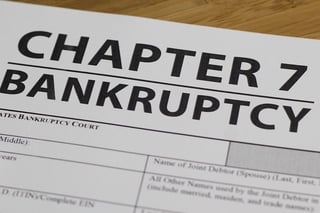 When I meet with clients who are facing financial difficulty, I tell them that the first thing we have to decide is if they need to do something to resolve their debt issues, other than just using the same debt reduction strategies that they’ve been using up until the time we met. For the vast majority of the people I meet with, the answer to that question is yes - the reason they are in my office is that they don’t see a good financial outcome by maintaining the status quo.
When I meet with clients who are facing financial difficulty, I tell them that the first thing we have to decide is if they need to do something to resolve their debt issues, other than just using the same debt reduction strategies that they’ve been using up until the time we met. For the vast majority of the people I meet with, the answer to that question is yes - the reason they are in my office is that they don’t see a good financial outcome by maintaining the status quo.
Once the decision that a change is necessary is made, we then look at whether filing a bankruptcy is the best option, or whether some other strategy, or combination of strategies to eliminate debt is better. Again, for most of the people I meet with, the answer to that question is that a bankruptcy case is going to be the most cost-effective way of dealing with debt problems that have become overwhelming.
I tell my clients that at their first appointment, that’s really all the decision-making that we have to do: do we need to do something different to pull out of a financial tailspin, and if so, is bankruptcy the right choice? I tell clients that the bankruptcy chapter that we use - either chapter 7 or chapter 13 - is a decision we make after we’ve received more information and done more research on a client’s specific and unique financial situation.
If filing a chapter 7 bankruptcy is recommended for a client, the client often asks: “if I file a chapter 7 bankruptcy, will it ‘work?’ Will I receive a discharge?” It’s a result-oriented way of asking what the requirements are to file a chapter 7 bankruptcy case and receive a bankruptcy discharge. That’s what we’ll look at this week.
Who can be a Chapter 7 Debtor?
The very first requirement is whether the person I’m dealing with can file a chapter 7 bankruptcy. That’s an easy question to answer. Section 109 of the Bankruptcy Code tells us who can file a chapter 7 case, and it’s not a very restrictive statute. Section 109 tells us that a “person” that resides or has a domicile, a place of business, or property in the United States, or a municipality may be a debtor. Don’t be deceived by the word “person” in section 109 - it has a broader meaning than you might expect. Section 101 of the Bankruptcy Code is the definition section for the Code, and it defines “person” very broadly: a “person” is an individual, partnership or corporation. So for chapter 7 purposes, people and businesses both can file.
The Means Test
The next question for the person who would prefer to file a chapter 7 bankruptcy is whether that person’s income is such that filing a chapter 7 bankruptcy is not an abuse of the bankruptcy system. The policy behind making sure that “abusive” chapter 7 cases aren’t filed is clear: a debtor with sufficient disposable income should file a chapter 13 repayment plan rather than a chapter 7 liquidation. When Congress passed a major reform of bankruptcy law in 2005, it attempted to codify this policy goal by requiring people who file chapter 7 cases to fill out a test of disposable income. It’s a two-part test: the first part is determining whether the debtor’s household income is above or below the median income for a household that size in the state where the debtor resides. For point of reference, the median income for a household of one in Minnesota is approximately $51,000; the median income for a household of four is approximately $100,000. If a debtor’s income is below the median, then there is no further testing that has to be done - the below-median debtor is “qualified” to file a chapter 7 bankruptcy case.
If the debtor’s household income is above the median, that does not automatically mean that the debtor cannot file a chapter 7 case - it means, though, that the debtor must go through a means test to see whether the debtor’s household has “positive disposable monthly income” or “negative disposable monthly income.” To determine this, the debtor must supply financial information about household expenses. Some expenses specific to the debtor - such as the amount of car payments or mortgage payments are used. Other monthly expenses - such as food, clothing and medical expenses are based on IRS repayment standards, specific to the area/region where the debtor resides. If, after deducting the means test expenses, the debtor has a negative disposable monthly income, or if the debtor, while having a positive disposable monthly income, has a small enough positive number that the debtor would not be able to pay even a modest amount to the debtor’s unsecured creditors in a 60 month chapter 13 plan, then the debtor may file a chapter 7 bankruptcy.
There is one notable exception to the requirement to complete a determination of median income/means test. If a debtor’s debt is “primarily” non-consumer debt, it is not required that the debtor complete the determination of income and/or the means test. There is no Code definition of “primarily” - so the bankruptcy courts have had to determine what that means. The courts have held the “primarily consumer debt” means that a majority of the debt owed by a bankruptcy debtor is non-consumer. Consumer debt includes personal credit cards or personal loans, home mortgages, car loans for personal use, medical bills and student loans. Non-consumer debt includes tax obligations and business-related debt such as small business loans or business lines of credit that have been personally guaranteed by the debtor.
Credit Counseling
Provided that the means test doesn’t create a problem, the next step for the chapter 7 debtor is to complete a credit counseling briefing prior to filing the bankruptcy case. The credit counseling briefing can be done in person, over the phone or online. Only non-profit credit counseling services that have been approved by the United States Trustee’s office can offer this credit counseling service. The credit counseling requirement is also a creature of the bankruptcy reform law of 2005. It is designed to require debtors to review their financial circumstances with a qualified, neutral, counselor before filing a bankruptcy case. In theory, credit counseling would deter bankruptcy filing and re-route debtors into alternative programs. In reality, it doesn’t - not one of my clients has decided not to file a bankruptcy case because of information received during credit counseling. It has become simply a “stop on the road” to filing a bankruptcy case.
These are the requirements to file a chapter 7 case. Next week, I’ll write about what isn’t required, and I’ll write about receiving a discharge.


